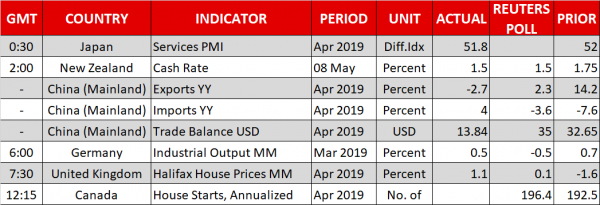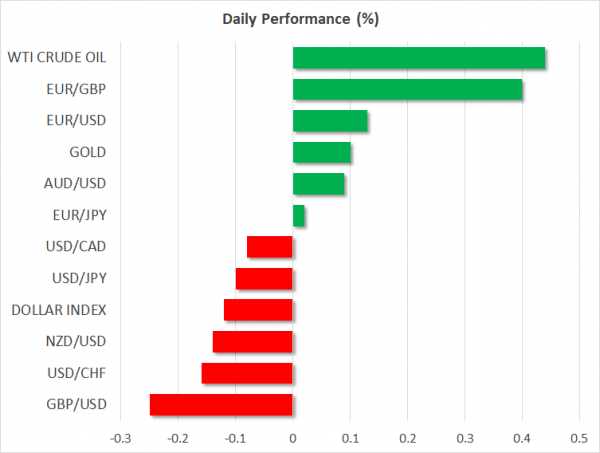- Stocks plunge, haven assets shine as markets focus on trade risks
- RBNZ eases its policy, but kiwi bounces back
- Pound tumbles amid lack of progress in cross-party Brexit talks
Risk aversion accelerates as trade worries prevail
Trade concerns dominated price action on Tuesday, with global stock markets accelerating their losses while haven assets like the Japanese yen extended their gains, as traders continued to reduce their risk exposure ahead of crucial events later this week. Strikingly, there was no fresh catalyst behind the latest wave of risk aversion, which instead seems to have been a delayed reaction to Trump’s tariff threats, that markets had taken rather lightly so far.
Investors will now brace themselves for what promises to be a rocky conclusion to the week, as another round of US-China trade talks will kick off in Washington tomorrow. The Trump administration seems adamant to impose fresh levies unless Beijing makes immediate concessions, and given that China typically doesn’t yield under such pressure, an escalation in tensions appears increasingly likely. Hence, risk sentiment could remain sour in the near term, keeping equities under pressure and safe havens in demand.
RBNZ cuts rates, but kiwi recovers quickly
The Reserve Bank of New Zealand (RBNZ) cut its benchmark interest rate overnight, in a move aimed at shoring up inflation and boosting growth as the economy grapples with subdued investment and global trade risks. The central bank also signaled roughly even odds for another cut in the coming year, via lowering its interest rate forecasts further.
The kiwi fell sharply on the decision, as markets were pricing in only a ~40% chance for a cut ahead of the event, but staged a remarkable comeback in the following hours to recoup nearly all its losses against the dollar. Investors seem to be taking the view that this was more of a ‘one and done’ rate cut, and not the beginning of a prolonged easing cycle – something evident by market pricing for further cuts this year now being quite subdued. As for the kiwi, near-term risks still seem tilted to the downside, mainly due to trade uncertainty.
Pound tumbles as Brexit progress remains elusive
The British pound is on the retreat on Wednesday, with the latest reports suggesting that cross-party talks between the Tories and Labour are far from bearing fruit. Sentiment towards the UK currency seems to be shifting again, not only due to the lack of progress in these talks, but also due to repeated calls from key Tory lawmakers for PM May to resign. Meanwhile, the new Brexit Party led by Nigel Farage is leading the polls for the EU Parliament elections, suggesting that Eurosceptic voices may remain prevalent.
In the near term, a lot will depend on whether the Tory-Labour talks finally produce anything of substance. If they do, the pound could soar, not least because that would catch markets by surprise. However, since that is looking increasingly unlikely, uncertainty may continue to reign over British assets, implying that more pain may be in store in the immediate term.

